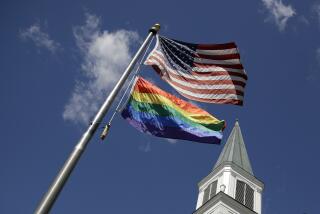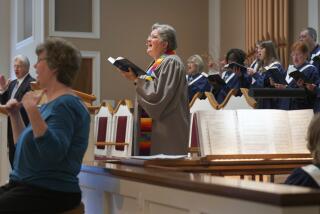Some Denominations Cut Back Ministries for Disabled : Finances: The reductions occur because donations to some national churches are declining, officials say. Advocates worry that gains are being eroded.
- Share via
No one in Ginny Thornburgh’s church ever asked why she left her third son at home during Sunday worship. They didn’t ask about the mentally retarded boy, and she assumed he would be unwelcome.
But just how little her church cared about her disabled child became clear when Thornburgh’s fourth child was born. This baby was not handicapped, and her fellow congregants told her all about the nursery and implored her to bring the child.
“That’s when it hit me, and I’ve never rested since,” she said.
Thornburgh, wife of former Atty. Gen. Richard Thornburgh, is now the director of the religion and disability program of the Washington-based National Organization on Disability. Her son, Peter, goes to a church where he assists the minister at worship.
But such gains may soon be in danger of slipping away as several denominations cut back on disability ministries because of budget problems.
In the Evangelical Lutheran Church in America, the disability ministry office has been cut back from full- to part-time, and in 1995 it will be eliminated. The Episcopal Church has already done away with a disability ministry office at its New York headquarters.
And in the Presbyterian Church (U.S.A.), a halftime position was eliminated and the job given to another staff member who is able to devote less than a tenth of his time to disability ministry.
Disability programs--and other ministries--are suffering painful cutbacks as donations to national church offices in many large Protestant denominations have dropped, church officials say.
“I disagree with the notion it was an easy cut,” said Dennis Busse of the Lutheran Office for Disability Ministries.
Others say the severity of the cutbacks indicate that handicapped ministries took a disproportionate but not unexpected hit.
“The church has a continual record of failing to recognize people with disabilities,” said Mark Wendorf, executive director of the Presbyterian Health, Education and Welfare Assn.
What concerns advocates for the disabled is the very thing that they have been fighting for--increased visibility and recognition of the disabled--will be undermined as national church bodies do away with offices that forced denominations to be sensitive to such ministries.
“Until a person experiences a disability themselves or has a family member with a disability, it’s far from their consciousness,” says Alonna Gautsche Sprunger, a consultant to the Committee on Disabilities of the National Council of Churches.
One day, churches may on their own become accessible to the disabled.
“That’s our goal, but there’s a lot of concern we’re not at that point yet, and . . . there are a lot of people being lost on the way,” said Sprunger, who is also director of advocacy programs for the Mennonite Church.
The outlook is not all bad.
In the Southern Baptist Convention, the nation’s largest Protestant denomination, a disability ministry staff person and publication lost to budget cuts earlier this year were restored after an outcry from the pews.
And some churches are considered to have model programs.
The Christian Reformed Church, for example, has pledged to conform with the Americans with Disabilities Act, although churches are exempt from many of its provisions. A church subsidiary, Friendship Ministries, promotes one-on-one relationships with mentally disabled people.
“Everyone must have his or her opportunity to bless the church with what he or she has been given,” said the Rev. James Vanderlein, director of the church’s Committee on Disability Concerns.
Mary Jane Owen, executive director of the National Catholic Office for Persons with Disabilities, said most dioceses have their own disability ministry offices, and increasingly those are being expanded.
“I am encouraged. I am not discouraged,” she said.
So far, the United Methodist Church has kept its disability ministry staff despite budget pressures.
“We’re very saddened by the fact that many of our sister denominations have cut back,” said Kathy Reeves, executive secretary for ministries with people with physically and mentally challenging conditions in the United Methodist Church.
Society may glorify perfection, but Jesus’s ministry is clear that people of all physical and mental abilities should be included in the church.
Where both disabled people and churches will benefit, she and other advocates say, is when people with disabilities are looked upon as untapped resources for the church, rather than as liabilities.
“What people basically want is that they are part of the community,” she said. “Not just to give to that person but to receive the gifts that person has to offer.”
More to Read
Sign up for Essential California
The most important California stories and recommendations in your inbox every morning.
You may occasionally receive promotional content from the Los Angeles Times.













